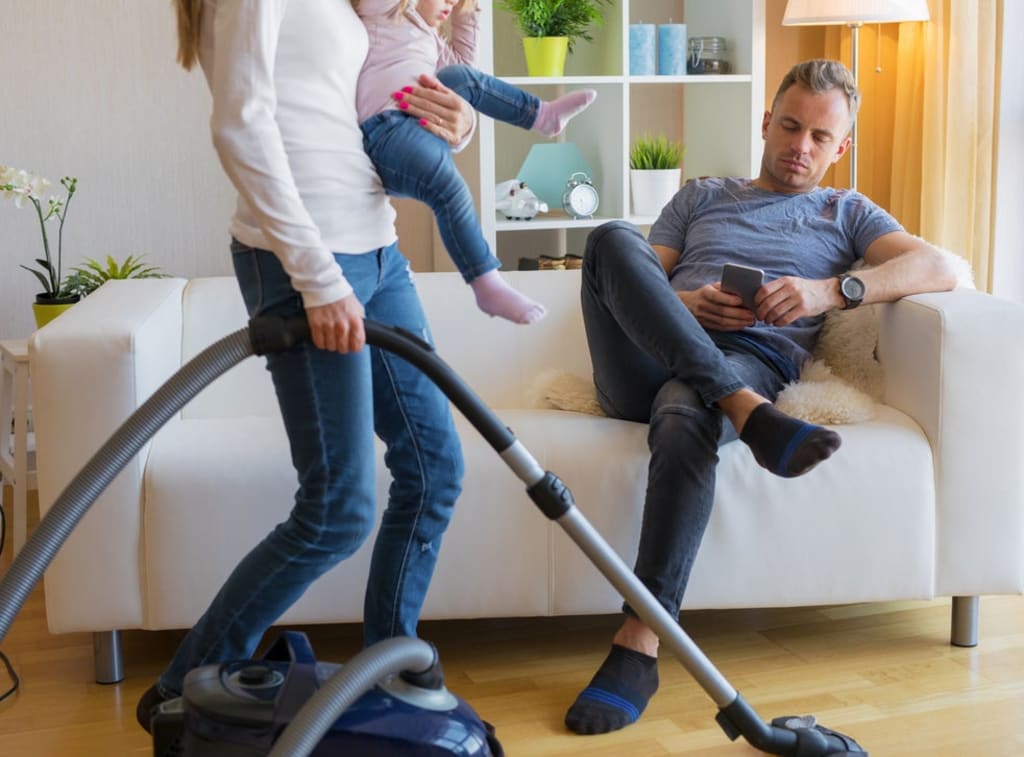Gender Stereotypes Are Being Reinforced After Years Of Hard Work To Remove Them

Women are doing significantly more housework and care-giving than men.
That’s according to new research carried out by LeanIn.org which proved that because we are all being asked to work from home during the Covid 19 pandemic, the burden of doing housework is regularly being put on women and is undoing years of work in undoing gender stereotyping which has in the past always said things like:
Women do the housework.
Women should always be in the kitchen.
Only men can go out to work and earn money.
Lots of work over the years had been put in to ensure that everyone has joint conjugal roles after marriage i.e. they must share household tasks and chores and not use any gender stereotyping to dictate who should do what in the household.
Now that the UK is heading in to a second wave of the Covid 19 pandemic, more pressure is being put on women to do more housework or look after the children more often. During lock down when everyone had to stay and quarantine at home, it was easier for men and women to share household tasks and care giving responsibilities.
COVID-19 restrictions have led to many households returning to traditional gender norms, according to new research by Vienna University of Economics and Business.
The researchers, led by Dr Katharina Mader, a researcher at the Institute for Heterodox Economics, asked participants about their working day and to report their use of time in intervals of 15 minutes – she then added up the hours of paid and unpaid work they did.
“For many, the limitation to 24 hours was challenging because the recent period has made it harder to separate home and work life. Feedback from respondents showed that their current days do not feel like they have 24 hours, but rather 36 to 42, which highlights the overload parents are currently experiencing,” says Mader.
The research revealed that single mothers worked the longest hours, on average almost 15 hours a day, with nine of those spent on unpaid work such as childcare and household tasks.
The results for couples with children are similar: mothers work 14.5 hours, nine and a half of those are unpaid, whereas fathers reported 13.75 hours of work, with seven of those being unpaid.
Furthermore, one in three women with a university degree and one in four women without a degree stated that during the lock down, and compared to their partner, they were doing a larger share of unpaid work than before the COVID-19 crisis.
“Regarding the division of childcare tasks our study reveals a clear backlash to more traditional gender roles. 70 per cent of females answered that they are doing the largest share of childcare, and they also reported feeling like they are doing most of this work alone – highlighting the associated psychological stress that women, especially mothers, have to bear,” says Mader.
Surveys have shown that women fear professional disadvantages far more frequently than men when they work from home, regardless of their career levels.
The researchers state that it is precisely because of these role models that women are rarely offered the option to work from home, because it is assumed that looking after children and household will prevent them from concentrating on their work. It is of great importance to make unpaid work more visible, especially when we must raise the questions of how parents and in particular mothers, are able to cope with a second lock down and/or school closures.
Women who work from home are regularly put under increasing pressure to look after children more often while men in the household can concentrate on their work. This can lead to them feeling over stressed and can develop symptoms of anxiety which can lead to them becoming mentally ill.
It has been revealed that Latinas and Black women are spending far more time on housework than white women (more than 75% of Latinas and Black women are spending 21 or more hours per week, compared to 55% of white women). Latinas and Black women are also spending an average of 4 to 12 more hours per week on childcare than white women, and 15 to 20 more hours per week caring for elderly or sick relatives.
To avoid increasing pressure being put on women at this time, men and women should the role of doing household tasks as well as looking after children and helping them with their school work. Only then can we live in a fairer society which places emphasis on equality and sharing family duties.